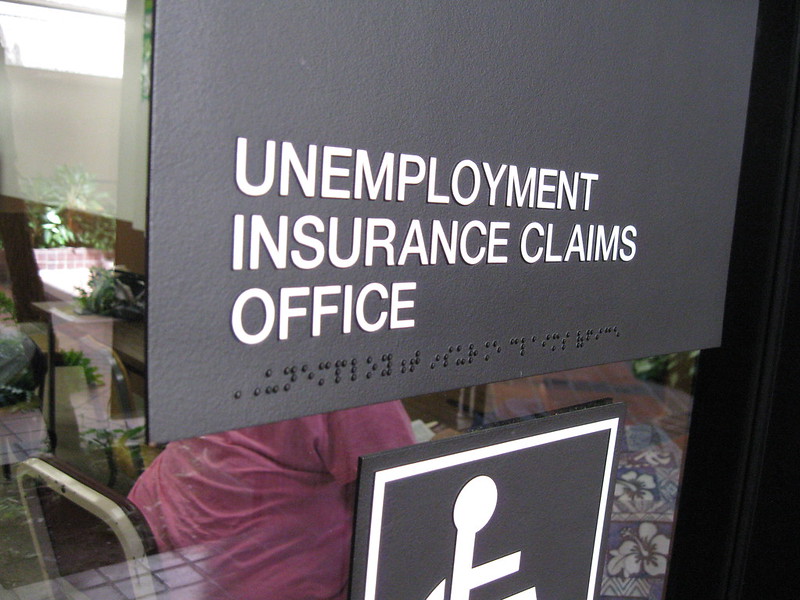Suit Seeks To End Ban on Jobless Pay for Disabled
Class-action claim charges 2013 state law violates U.S. Constitution.

Unemployment Insurance Claims Office. Photo by Bytemarks (CC-BY).
Eight Wisconsin residents who receive Social Security disability payments and who have also held part-time jobs sued Wisconsin in federal court Tuesday, charging that a state law that disqualified them from collecting unemployment insurance when they lost their jobs violates federal laws that protect people with disabilities.
“Workers who received Social Security Disability Insurance benefits have been deprived of their right to unemployment compensation benefits, even when those workers lost their jobs through no fault of their own,” lawyer Paul Kinne said at a news conference Tuesday. Kinne is part of a team of lawyers from three firms who filed the lawsuit in the U.S. District Court in Madison.
The lawsuit charges that the law violates the Americans with Disabilities Act (ADA), the federal Rehabilitation Act, the Social Security Act and the 14th amendment to the U.S. Constitution, which guarantees due process.
The suit seeks class-action status, potentially representing all laid-off Wisconsin SSDI recipients who have been denied unemployment insurance (UI). If it is successful, it could cover UI applicants who were SSDI recipients going back six years, Kinne said. It also proposes a second class-action group of SSDI recipients who were granted UI benefits, then ordered to repay them or to pay a penalty.
While the suit challenges a law that was enacted over the objection of Democrats in the Legislature by Republican lawmakers and then-Gov. Scott Walker, it names Amy Pechacek, secretary-designee of the Wisconsin Department of Workforce Development (DWD) as the defendant.
The lawsuit also criticizes the current DWD’s handling of UI complaints by SSDI recipients, including some who were denied federal supplemental unemployment pay after the federal government told the state that they would qualify.
“The Wisconsin Department of Workforce Development is aware of this complaint,” DWD spokeswoman Jennifer Sereno said in an email message Tuesday.
The suit is being filed by Kinne, of the law firm Gingras, Thomsen & Wachs; Heath Straka, of Axley Brynelson; and by unemployment lawyer Victor Forberger.
Collecting SSDI and also working
A majority of people who collect SSDI also work part-time under the federal program, but since 2013, Wisconsin has barred them from collecting unemployment compensation if they are laid off.
Brian Bemke, one of the eight plaintiffs named in the lawsuit, says his disability payment doesn’t cover his monthly expenses, so that when he lost work during the pandemic, he needed — but was denied — state unemployment compensation.
In order to pay for food, clothing and other needs, he needs to work, he says — but he also wants to work. Jobs he’s held include working in a hotel and working for a business that makes posters. His condition, and the federal Social Security rules, allow him to work two or three days a week.
“I want to work,” said Bemke. “I’m doing my best to work.”
Twice during the pandemic, however, he has been laid off from work and was denied state unemployment compensation because of the Wisconsin law.
Walker signed the law after it passed the Legislature on partisan lines, and signed a subsequent revision in the 2015-2016 legislative session. Only North Carolina has a similar ban.
The law and the lawsuit
The Walker-administration DWD claimed in its 2012 proposal for the change that most SSDI recipients didn’t work and therefore, if they collected unemployment pay, they were “double-dipping” and probably committing “fraud.”
But that’s not true, says Forberger. The Madison lawyer has represented a large number of people whose UI applications have been denied, including SSDI recipients, and maintains a blog on Wisconsin unemployment compensation issues.
The federal Social Security Administration program allows disability insurance recipients to work part-time if they are able to, and encourages them to do so under programs that ensure they do not lose their disability payments or their medical coverage under Medicaid.
“This whole problem got premised under the idea that disabled people do not work,” Forberger said. “That is just not true at all.”
Bemke and the other seven Wisconsin residents named as plaintiffs in the lawsuit are all people who have been denied unemployment pay because they receive SSDI benefits. Four of them have been required to repay unemployment benefits that had been approved at one point before being rescinded.
Some of the plaintiffs have been approved for federal Pandemic Unemployment Assistance (PUA) — a temporary supplemental unemployment benefit included in federal pandemic relief legislation — but have been waiting for their benefit. Others have seen their PUA payments reduced because of other problems involving previous UI applications.
The federal PUA program and other federal unemployment supplements ended last week.
In his original 2021-2023 budget proposal, Gov. Tony Evers proposed language that would end the exclusion of SSDI recipients from the state’s unemployment insurance program. The Evers proposal was removed from the budget by Republican majority on the Legislature’s Joint Finance Committee.
Forberger, however, criticized the Evers proposal when it was first introduced, because as it was written, unemployment pay for SSDI recipients would be reduced by the amount of their SSDI payments.
Federal lawsuit seeks to overturn state ban on jobless pay for disability recipients was originally published by the Wisconsin Examiner.





















